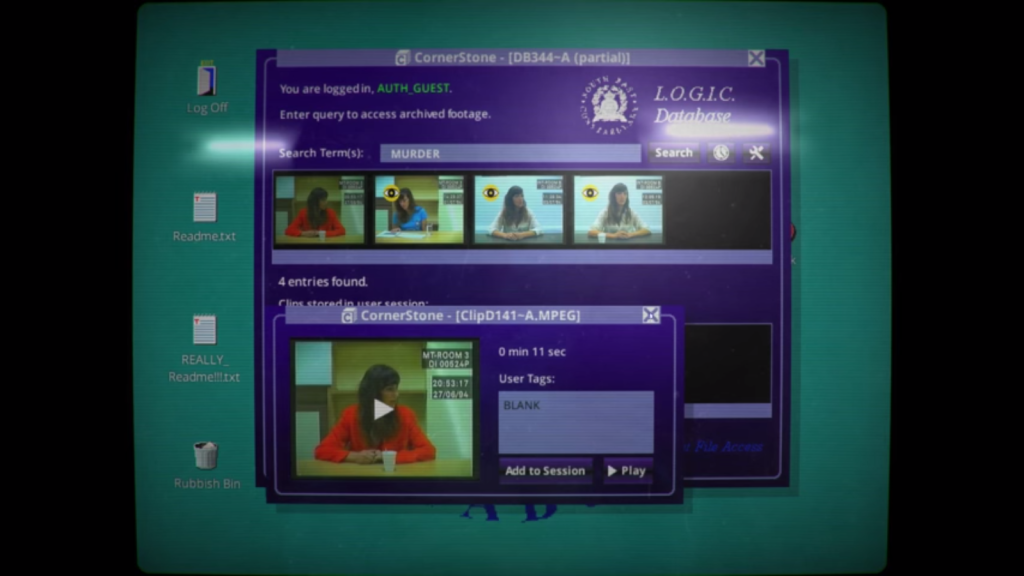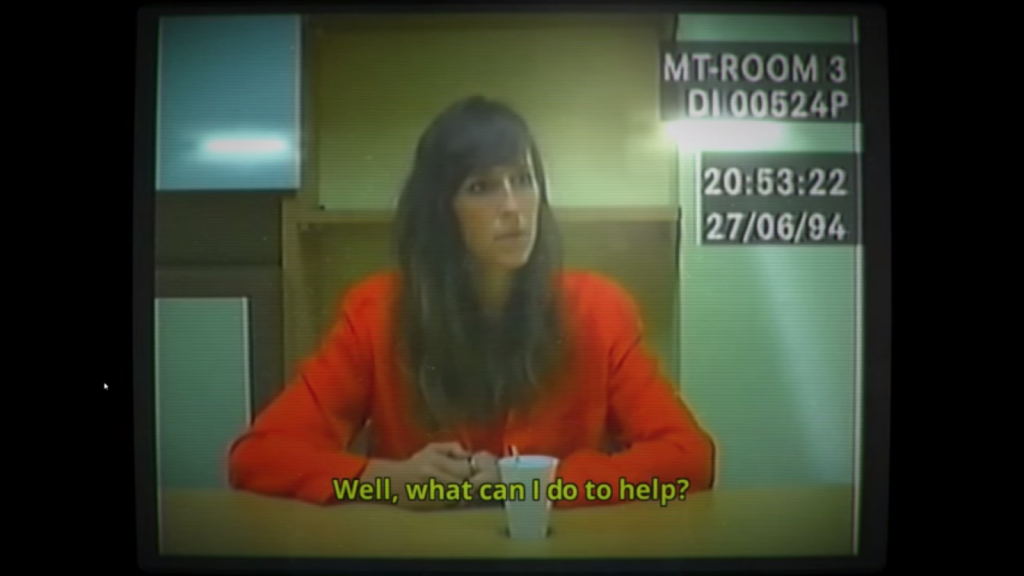“Her Story” by Sam Barlow – Theater and games
|
‘Her Story’ is an interesting experiment in interactive storytelling. While it can be considered more a game than a theatrical piece or an installation, it has many elements of expanded theater. It is my belief that this game is a step in the right direction towards re-defining what storytelling is and draws many parallels to the ‘Epic Theater’ as proposed by Bertolt Brecht. At the same time it may be what could be the first steps towards creating audiences that possess an affordance and are capable of constructing their own narrative. YouTube / Her Story Video Game – via Iframely The game revolves around a police database filled with video footage of a woman being interviewed with regards to a murder. The entire mechanic revolves around watching one of these videos and piecing together what actually happened. Having watched a video new videos are unlocked which the guest can find by entering a particular key word into the search box. The database is actually quite large and its best to keep the key word as specific as possible. Each video shows an interview the woman gives at a different time period. Each video shows a different side to the woman. But what is most amazing is how much an unreliable narrator the woman is, the story being told changes from video to video, it forces upon us a relationship to the woman we see. Her body language, her reactions, her truths and lies connect us in a peculiarly unemotional yet critical way to the woman in the footage; we bond with the moving, changing and constructed story rather than her herself. The most interesting part though is that there is an invisible wall between us and the character. This wall is formed by the immersion we have into the interactive piece. The amount of information we learn is completely based upon our biases, our opinions and primarily how much we buy into the experience. The more we role play a detective, or a prosecutor, or a defense attorney, the more we learn. At the end of the day one can merely walk away with whatever they believe to be true, but at the same time there is a draw, a hook, a drive to know who actually murdered this woman’s husband. Now, I know that this is not in and of itself a theatrical piece but to me it has many elements that are relatable to the ideas that are proposed in the Epic Theater as realized by Bertolt Brecht. Brechtian theater states that the audience should not emotionally attach to the characters and story but should provoke self-reflection and a critical perspective. In many ways this story forces that upon us. If played with a bias towards whether or not the actress in question is innocent but is best played as a detective breaking down the interviews with an analytical approach and hunting down clues with a hunger for the truth. Verfremdungseffekt is technique of alienating or creating a sense of detachment in the audience so as to ‘force’ them to be critical rather than emotional. In ‘Her Story’ everything is viewed through a terminal to the police database, the footage looks like that of an old camera. There are no questions heard or interrogator seen, all we see are the responses. Emotionally we are detached from the character we have nothing to form a relationship with her, instead we look for her objectives, we critic her narrative, we question her motives. We use waht we find from this inquiry to delve deeper into the narrative, literally by putting the word into a search box. This is a highly analytical relationship which is very different from most games. Normally in a game that is story driven the narrative puts us in a position to want to help someone, the narrative and mechanics are all based upon an emotional connection we have to our surrounding cast, we are the hero or villain who is all powerful. Yet here we are nothing to this character, we are merely watching her in an awkward Alfred Hitchcock-esque method. But the whole purpose of alienating the audience creating a distance between them and the theater is to showcase just as the theater which a representation of reality can be changeable so can reality be changeable. And here we are looking at a person who like ourselves is changing over time, her recollection like ours becomes hazier, stories get mixed up words get changed. In many ways it is as though we are in some vague third person way looking at recordings of our lives and the way that we have changed over time. But here is what keeps me drawn to this ‘game’ such a viewpoint as stated above requires reflection after being immersed, whether emotionally or analytically. The more we contribute in terms of time effort interest the more we receive from the game, the more immersed we become, yet we continue to maintain emotional distance from the character and are connected with the overall experience and narrative without drive. At this point we are immersed in the game and the representation of reality but in some ways are detached from the actors and know that this is merely a representation, merely a game. “On the one hand the spectator must become more distant, on the other he must lose any distance. On the one hand he must change the way he looks for a better way of loo king, on the other he must abandon the very position of the viewer.” – Jacques Ranciere. While I may be pushing it in terms of co-relation as again this is not a theatrical production. I feel that the core construct of what this piece is trying to be is an attempt at creating a narrative that is both linear yet not a narrative where the audience gets as much as they put in a narrative where the audience is moving towards becoming ‘emancipated’. A lot of what Ranciere talks about in his speech has to do with the analogy to a teacher-student relationship. In many ways Brecht in his attempt to show the audience a subject has chosen to be a ‘teacher’. Yet what I understood from Ranciere was that the best way for the teacher to teach, they must allow for the student to mire through the world and find the answer to the questions and the teacher without bias must present all that can be mired through. This is what ‘Her Story’ does well. We find a mass of videos based on what we asked for and it now our responsibility to mire through it. Whether we take upon this responsibility and find something new learn something about this person is up to us,we can just as easily walk away or try another search query. This empowers us as the audience to become able to construct our own montage of representative footage, akin to what Brecht used in his works,yet again it is montage that is provided to us by the ‘teacher’ – the game. We are able to represent this woman, this mirage of what is real, throughwhat we have seen and whatwe have decided upon from an analytical viewpoint. Obviously the game does not speak in particular about a social issue that needs to be dealt with although it does speak a lot about how we change over time and how our memory is exceedingly fickle, I believe that this type of approach can be used to change the way theater and other arts that are pushing to find ways to involve, immerse and empower the audience. But this game does something more than just allow for a singular experience to be constructed and wlaked away from. Due to its very nature of personal analysis it opens up a forum for discussion. A forum where clues are shared, opinions are argued through, where a discourse about this fictional character and the crime committed are constantly discussed. Apply this mechanic or tool or experience generating system to a meaningful discourse or a story about a social issue that is currently prevalent. We now have equipped our productions with an ability that can incite to some extent discourse by the audience, with the audience about their own analysis of a piece of story or narrative that may not mean much as itself, but has through being experience, generated meaningful conversation. We have taught not by giving the answer or by telling the guests or the audience what we believe to be the answer but rather by allowing them to search through a narrative to construct their own experiences and then argue about what truly the experiences and the narrative meant and tried to show. And this argument is not a destructive hate filled one that entertains a third party but rather a constructive one which causes people to re-watch to re-experience to search again in thr hope of finding more. I believe that such games may contain the solution to making an empowered audience, an audience that is not merely given the power to see and do what they want within the construct of affordances provisioned but are able to experience what they in a meaningful way that can be enhanced through sharing and creates even more inquiry within them. References:
|



